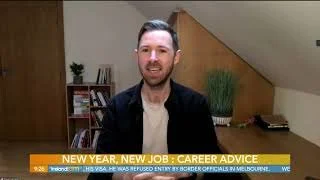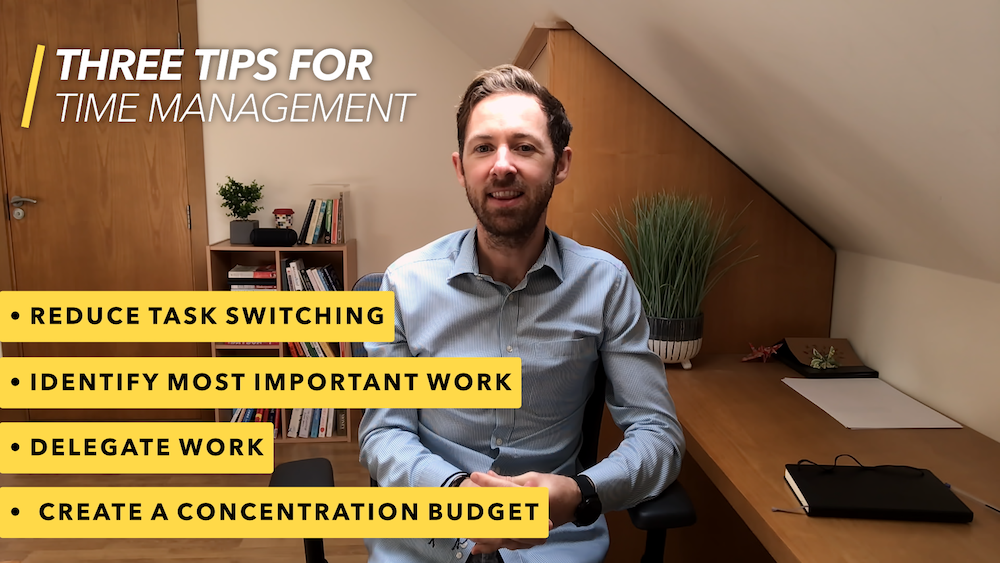This is a live, online workshop on the best tips and techniques for creating an effective cover letter, focusing on content and tailoring it for a specific job or industry. You'll learn about the structure of a cover letter and the 5 main points that should be included in it. Also, I'll touch on a little-used tactic for getting the attention of any employer!
Read MoreThis is a live, online workshop on the best tips and techniques for creating an effective CV, including everything from formatting and content to tailoring it for a specific job or industry. You'll Learn: - How to distinguish your CV from your cover letter - The best way to "sell yourself" in writing - Two common mistakes to avoid in your career summary - Make your applications eye-catching through powerful verbs and phrases - Tips for tailoring your applications to specific jobs - How to give weight to your experience and achievements
Read MoreOften, when people want to change jobs, one of the main difficulties they face involves feeling stuck in the same position because it’s all they’ve ever done. And while this may be true in some instances, it’s not true that they don’t have any skills that could be used in other positions — transferable skills in other words. Remember that whenever you go to a new workplace or company, you have to learn the details of the new position.
Read MoreBy far the most common problem I encounter in the job search is a lack of clarity. If you find that you don’t like any of the jobs, then describe what the ideal job would look like in detail, before searching for it. If you feel like you’ve followed all of these instructions fully and still can’t find something you’re interested in, there could be a couple of reasons for this, and maybe we need to go deeper again. I hope you’re starting to see that the best strategy is the one you create by deciphering what search criteria work best for you. To do this effectively, I encourage you to listen very carefully to what you like or don’t like about any given position. Then, use that feedback to update your search criteria. A word of caution: if you find yourself saying, 'no' to most or all of the roles, then something is radically wrong. Here are some common problems and solutions. If you find yourself:
Read MoreQuitting is a job can be difficult. We worry about the consequences for our career, the rebuttal from our manager, and perhaps most of all, the awkward conversation. Lots of different thoughts can go through your mind from, “what if they ask me to stay?”, and “what if they offer me a different position that I don’t want?”, to “what if they guilt me into staying for another few months?”, and “what should I do if they promise me there will be changes, when I know that in reality nothing will change?”. And so on… But how can you deal with this situation?
Read MoreCommercial Awareness is worth clarifying. It relates to the ability to increase revenue or reduce costs. You could also think of it in terms of understanding the cost/benefit of undertaking an initiative or plan. Is it worth your while? Is it worth the risk? Does the organisation stand to benefit from it more than the cost?
Read MoreBelief changes everything. If you believe you can, it makes sense to go for your goals. If you believe you can't, you may feel disempowered and frustrated. But beliefs come from different places and vary greatly depending on the person. Beliefs cross every aspect of our lives from work to relationships to political affiliations. Many of our beliefs are so unconscious that we consider them more like facts than just beliefs. In reality, they may be unique to us. When I was in school, I had a belief that I'd have to learn a language to set myself apart from the competition. That belief wasn't true or helpful. In fact, it sent me in the wrong direction for longer than it should have. It was a limiting belief, meaning a belief that limited my growth.
Read MoreCompetency-based interviews are aimed at finding out if you can demonstrate your abilities by describing past professional experiences. Every time you hear a question that starts with "tell me a time when…" or "could you give me an example of…", you're being asked about your experiences. Many people will wonder how much detail they should go into — the answer is to be detailed yet concise while sticking to what's relevant. A good rule of thumb is to provide as much detail as possible once it adds value. It's worth having two examples for each question just in case the interviewer asks for another — it's not the sort of question you want to get stumped on. Also, it's best to use a set structure for your answers, such as the STAR model:
Read MoreIf you’ve had a bad experience at work recently, expressive writing is a good way of mentally processing your situation. Expressive writing is the act of writing freely to express your emotions. It allows you to confront what happened, reduce upset over sensitive issues (e.g., workplace conflict, redundancy, unfair dismissal, bullying) and provide you with a way of releasing tension surrounding the issue. It has been proven to increase the chances of reentering the workforce for people who’ve been laid off.
Read MoreIf you left a job recently, it's important to have a good story for why you left (be positive, be gracious, and be clear). Don’t over-elaborate on what happened — that may lead to difficult questions. Be able to tell them how you benefited from the position, what you achieved and what your responsibilities were. Even if it was a nightmare situation, highlight what you learned from it. For example, if you had a boss who couldn’t give clear messages, you could reframe the situation, saying that you learned a lot about communication. If you had a huge workload, you could reframe the problem, saying that you learned how to manage multiple competing priorities. Reframing is really all about being able to say “the glass is half full rather than half empty”. If you want to come across well in an interview situation, I suggest you reframe negative experiences into positive learnings.
Read MoreWe all have beliefs about life, the world, relationships and of course, work. They can be empowering or disempowering, conscious or subconscious. Removing limiting beliefs is a key step in achieving goals. But if we don’t move recognise and accept where we’re getting stuck, it can be difficult to make progress. For example, if you believed that there weren’t any interesting jobs available right now because of market conditions, why would you even bother looking? And then if you don’t look for them, of course, you won’t find them. The belief stops the action and the inaction leads to a negative result. This in turn becomes a self-fulfilling prophecy. If you’re unsure of what your beliefs about work are, here are some questions to get yourself started. Of course, you must answer them honestly or else you won’t learn anything about yourself.
Read MoreI spoke to Simon and Elaine on Ireland AM about:
when you know it's the right time to leave a job
how to leave on good terms - why it's important to write a good CV and
the best way to do video interviews
You’re busy, stressed and starting to feel overwhelmed. And why wouldn’t you be? You’re time-poor because you always say ‘yes’ to everyone else’s requests. What’s more, they love you for it. So while you’re benefitting in the short term from this behaviour by receiving praise from everyone else, it’s ultimately going to weigh down your chances of progression. In addition, it keeps you stuck working in the business and not on the business. In other words, you’re working tactically and not strategically.
Read MoreI got a chance to sit down with DJ and presenter, Keith Walsh, to discuss all things career in this podcast. We touched on lots of different topics and probably could have spoken for twice as long. It was a particularly interesting conversation because Keith himself had dealt with and successfully overcome some challenges in his own career in recent times, so he was no stranger to the topic
Read MoreHow do you react when you get criticism from your manager? Do you become defensive or are you open to listening to their feedback? Here are some tips:
Read MoreTime management is one of those things that we all struggle with, from identifying what’s important and what’s not important, to learning about our own best ways to work. In this video, I outline three tips for managing time better and getting the most out of your efforts. In this video I will discuss three tips:
Read MoreSometimes you might need to make a job application that stands out from the crowd. Sometimes you’ll need to explain something that an employer might miss by simply reading your application. With that in mind, it might be worthwhile sending in a video application to really get their attention. Vidyard.com is a nice app to use for this. You can download it by visiting the Chrome Web Store.
Read MoreI think self-employment is going to become increasingly realistic and enticing for more and more people as we drift closer towards a remote-working environment. The COVID pandemic has shown how our jobs, companies and industries can change quickly. What were once secure jobs can suddenly (almost overnight) disappear. We may need to revisit the idea of putting all our eggs in one basket of our employer and consider spreading our income risk.
Read MoreFirstly, you must believe that it can be done! Remember that everyone has had to do it at some point.
Secondly, focus on what you do have to offer (e.g., skills, strong work ethic, volunteer experience, good attitude). Attitude is everything — if you’ve a good attitude, you can be trained. Outline your good attitude (positive, open), adaptability and ability to learn quickly. Outline any experience you’ve gained in a sports or social club, volunteer work or other extracurricular activity. Remember that you’re not expected to have done a million things when you’re young. All you have to do is put your best foot forward.
Then, simply show up! Often we can underestimate the impact of simply being on time and being consistent, but it’s really so important for building trust and demonstrating reliability.
Read MoreThis one stumps a lot of people. I actually think it's probably outdated considering that our world moves so quickly these days — few people actually think in terms of 5-year plans. Nevertheless, if they ask you this at an interview, you'll need to have an answer ready. They want to do see that you're: Ambitious, Forward-thinking and Committed.
So we have to answer the questions: WHAT DO YOU WANT? WHY? AND HOW? What title do you want? Who do you want to become? (skills, knowledge, experience, education, network, accomplishments, industry)
Read More




















